Monday, August 3, 2020
NIO delivered second highest ever of 3,533 vehicles in July 2020, increasing by 322.1% year-over-year
Sunday, August 2, 2020
Nio delivered a total of 4,152 units in July from Chinese news outlet [Unconfirmed]
According to the Chinese news website autohome.cn Weilai
[Nio] Automobile delivered a total of 4,152 units in July, of which 2,645 were
ES6 and 1,507 were ES8, a record delivery volume.
Today August 03, NIO officially announced the correct numbers. Chinese news outlet autohome.cn was a fake report and misleading one. Please refer here for the correct report.
It looks like the Chinese source which we referenced was taken down. We have a screenshot of the news which translates to the below in English
The Below report was a fake report which was circulated yesterday...Please refer here for the correct report
Full translation of the news reported as per autohome.cn
Weilai [Nio] Automobile delivered a total of 4,152 units in July, of which 2,645 were ES6 and 1,507 were ES8, a record delivery volume. The decline in ES6 sales is to give capacity to the more expensive new ES8. ES8 is expected to continue to rank firmly among the top ten medium and large SUVs. At present, due to parts procurement problems, Weilai's production capacity has reached its limit. Previously, the founder, chairman and CEO of Weilai revealed in an interview with Chewei New Media that Weilai is planning to expand production capacity and it is estimated that production capacity will increase significantly in September. In September, Weilai will usher in a new car EC6 and a 100-degree battery. With the increase in delivery of the new ES8, the reputation of the new ES8 is reported to be huge. The sales volume of Weilai in September is expected to rise to a higher level. According to Weilai President Qin Lihong, Weilai’s previous average delivery price was 450,000 yuan. As the proportion of ES8 rises, this average selling price will continue to rise. As a result, NIO will become the only car brand in the Chinese market that can buy more expensive products. This will give great support to the Weilai brand, and it is also a reflection of the increasing acceptance of the brand by users.
Technical Analysis: What happened on Friday [July 31] The Short Term and Long Term Support Level on NIO Inc. (NIO)
Why Plug Power, Bloom Energy, and FuelCell Energy Stocks Are All Moving Higher (Again)
Saturday, August 1, 2020
cheapest electric vehicle in the US -- and it comes from China It's called the Kandi K27
Affordability is tough when it comes to electric cars. Even mass-market EVs are often just a little out of reach for the average car buyer, especially considering how much further a dollar stretches when it comes to a traditional car with an engine.
So, can Kandi and its K27 tempt you with an unusually low price? This is a Chinese electric car that will be the most affordable EV for sale in the US later this year. Kandi revealed the K27 alongside the more expensive K23 model on Wednesday and plans to showcase both cars during a virtual event on Aug. 18.
The K27 costs just $19,999. Kandi promises it's a no-haggle, no-nonsense price. And that's before the $7,500 federal tax credit. That's cheap for any new car, but, well, the price is sort of reflected in the K27's looks.
Honestly, it looks like some sort of weird Smart and Mini Cooper combination. If it snaps necks, it'll be because onlookers are curious what the hell just passed them. We only have one photo of the interior, but it looks pretty no-frills as well. There's a tablet-style infotainment screen (with a blue display that looks bricked in the photo?) and a gear selector below. Next to it sits a dial for various modes. I wouldn't expect soft touch points or anything fancy, but it should check off the box for basic transportation.
The Kandi K23 and K27 look weird
Under the odd design sits a single electric motor that gets its power from a 17.69-kilowatt-hour battery. Drivers should be able to go 100 miles on a single charge, and Kandi acknowledges it won't be the car for long road trips; it's more suited for city dwellers.
While the K27's price makes headlines, the K23 seems more like it's actually geared toward American drivers. It's a small hatchback that looks like an awkward mashup between a Honda Fit and a Smart, but the cockpit looks nice enough. A big, vertical touchscreen sits in the middle and the materials look far nicer. Then again, we only have a couple of photos of the car.
The K23 is costlier at $29,999 before tax credits, but Kandi says it will go 188 miles on a charge. I can't tell if it's an odd proposition or a smart one. A Nissan Leaf, which looks much, much nicer, costs about $1,600 more, but it only has a 150-mile range to start. A Chevy Bolt EV is over $5,000 more, but it packs a 259-mile range.
I guess we'll have to see if Americans will stick their hands in the Kandi jar. The K27 and K23 will first launch in the Dallas-Fort Worth area by the end of this year.
NIO Price Target Analysis and its set to defy doomsters and open higher, levels to watch.
- NYSE: NIO is set to end the week and the month on a positive note.
- Nio Inc's shares are seen as expensive while it remains unprofitable.
- Lessons from Elon Musk's Tesla are promising for the firm.
Is a market capitalization of around $14 billion rich for an electric vehicle company? Some analysts suggest that NYSE: NIO current valuation – with shares trading above $12 – is expensive. The primary reasoning for the downbeat assessment on Nio Inc - ADR stems from a basic business lacking – profitability.
However, it is essential to note that Nio, based in Shanghai, China, was founded only in late 2014 and may need more time to turn a profit. The largest EV firm, Tesla, struggled not only with income but also with cash flow.
Nio shares were beaten more because of the china-US tensions. It should be noted that Nio don't sell cars in US and there profits come only from china markets. Whatever might happen between US and China it will have no effect on Nio china. Chinese people feel more anti-american than before which will help NIO over its rival Tesla. Like trump China wants them to buy more Chinese manufactured cars and there are more incentives for Nio than Tesla.
On the other hand, Nio has the backing of Beijing. Authorities may encourage locals to purchase the company's cars and thus create a national champion. Elon Musk's Tesla may be the market leader – but while it sells in China, the local rival may gain market share.
Tense Sino-American relations may weigh on Nio's sales outside its home country, but the vast Chinese market allows ample room for growth.
With all the above reasons I strongly feel Nio will reach $50 soon.
The next levels to watch are the weekly closing high of $12.70, followed by the mid-July peak of $14.09, and then by the high close of $14.90 achieved earlier in the month. The stretch target for bulls is $16.44, the 52-week high.
Support is found at Monday's low close of $11.69, followed by $11.09, a level recorded in the previous week. The psychologically significant $10 level is next.
Nio Inc - ADR has made a long journey from the 52-week low of $1.19 and is valued at over 11 times that price.
5 Best Electric Car Stocks to Buy for the Next 10 Years
Electric car stocks are on fire this year. You might be wondering what's going on.
Recently the KraneShares Electric Vehicle and Future Mobility ETF (NYSEARCA:KARS) is up nearly 30%, versus a mere 5% gain for the S&P 500. This move comes on the back of optimism that rising consumer awareness, coupled with strengthening government support, will drive 36% growth in electric vehicle sales to record high levels in 2021.
While those numbers — a 30% gain for electric car stocks and a 36% rise in electric vehicle sales — may seem huge, this is just the beginning. The numbers will only get way bigger over the next 10 years.
The reality is that this is the beginning of the future of transportation. Diesel cars on their way out. Electric cars on their way in. Electric stocks are also picking up.
Over the next decade, this shift will only accelerate as battery tech improves driving ranges, battery charging infrastructure expands, consumer demand pivots, automobile production capacity makes a similar pivot, battery and electric vehicle prices come down, and public and private pressure to cut carbon emissions escalates. It’s a confluence of tailwinds that will spark a once-in-a-lifetime transportation revolution — and ultimately make electric vehicles ubiquitous by the end of the decade.
Today, electric vehicles only account for about 3% of all passenger cars.
Needless to say, the best of this growth narrative is yet to come … and the best of the rally in electric car stocks will happen over the next decade.
With that in mind, here are the five best electric car stocks to buy for the next 10 years:
- Tesla (NASDAQ:TSLA)
- Nio (NYSE:NIO)
- Nikola Motors (NASDAQ:NKLA)
- Arcimoto (NASDAQ:FUV)
- Kandi Technologies (NASDAQ:KNDI)
Electric Car Stocks: Tesla (TSLA)
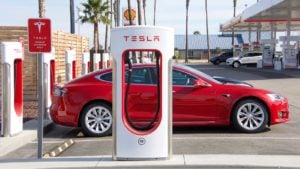
The godfather of the electric vehicle industry, Tesla is and will remain one of the best electric car stocks to buy for the next 10 years.
In 2019, Tesla controlled about 16% of the global passenger electric vehicle market. That number is up from 8% in 2017, thanks to new cars and geographic expansion.
These two drivers will remain in place for the next several years. Tesla will launch the Model Y this year. Then the Cybertruck after that. Then more cars after that. At the same time, the company will continue to push deeper into Europe, establish a premium leadership position in China and eventually makes its way into Latin America.
Against the backdrop of all that growth, Tesla will continue to produce the best cars in the business, because the company has a huge lead when it comes to battery technology and autonomy. Concurrently, Tesla’s brand equity is second to none. That strong brand equity won’t be diluted anytime soon.
Tesla will remain the unparalleled leader of the consumer EV market for the next several years. As the market booms, so will Tesla’s revenues. And Tesla’s profits. And the TSLA stock price.
Nio (NIO)
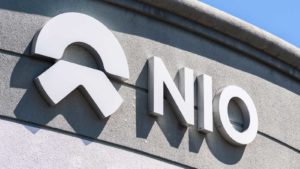
Tesla’s little brother from China, Nio, is also one of the best electric car stocks to buy for the next 10 years.
The premium EV maker went in reverse in 2019. The Chinese auto market crumbled. Chinese EV sales plateaued. Demand for Nio’s vehicles plunged. The company’s losses widened. The balance drained cash.
But everything has changed in 2020.
China’s auto market is rebounding, with auto sales posting positive growth in April 2020 for the first time in 21 months. China’s EV sales are once again setting monthly record highs.
Nio’s vehicle deliveries doubled in both March and April, and are expected to rise more than 150% in the second quarter. The company’s adjusted net loss narrowed by more than 40% in the first quarter. And the balance sheet scored 7 billion yuan in financing from a group of strategic investors.
These favorable trends will persist for the next several years.
Population growth plus urbanization will drive auto market sales growth. Rising consumer awareness, falling prices, expanding charging infrastructure and increased government support will drive bigger EV sales growth.
New vehicle launches and increased production capacity will drive even bigger Nio sales growth. Economies of scale will kick in, and today’s losses will turn into tomorrow’s profits. NIO stock will fly higher.
All in all, investors should stick with NIO stock for the long haul. This is a potential multi-bagger in the making.
Nikola Motors (NKLA)
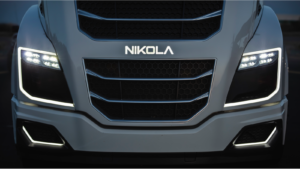
The newest electric car stock on Wall Street, Nikola Motors, made a splashy debut via a reverse merger in early June.
In a matter of days, NKLA stock soared from $30 to $90.
Why? Because this company has “Tesla of Trucks” written all over it.
In short, Nikola is a $23 billion next-generation vehicle maker. It’s leading the way in creating a new class of futuristic, zero-emission and cost-effective trucks. The company intends to first service the commercial market with electric and hydrogen delivery trucks, and then the consumer market with electric and hydrogen pick-up trucks.
If the company successfully executes against its opportunity to materially disrupt the trucking industry — and the company should be able to given its huge backing, technological advantages, strategic partnerships and hydrogen market leadership — then this could be a $100 billion company one day.
To that end, NKLA stock is one of the best electric car stocks to buy for the next 10 years.
Arcimoto (FUV)
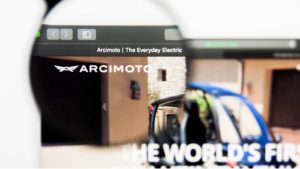
One of the more exciting electric car stocks in the market is that of $72 million, Oregon-based EV maker Arcimoto.
Arcimoto is all about three-wheel EVs. The company understands that the future of cars is not three wheels. But its bet is that three-wheel EVs have enough specialty use cases across the globe, that demand for these smaller, nimbler and cheaper vehicles will be quite robust.
And that sounds like the right bet to make.
Specifically, Arcimoto’s consumer-oriented product, the Fun Utility Vehicle (FUV), looks positioned to become a next-generation ATV of sorts. It will be the urban vehicle of choice.
Then there’s Arcimoto’s commercial-oriented products, the Deliverator and the Rapid Responder. The Deliverator is a three-wheel, compact delivery EV aimed at optimizing last-mile delivery logistics by improving speed and cutting costs. The Rapid Responder is a three-wheel, compact emergency EV aimed at enabling law enforcement, security and emergency services to more quickly and affordably respond to incidents.
Deliveries of FUV started in late 2019. Production of commercial cars will start in late 2020.
Across these various consumer and commercial verticals, Arcimoto’s potential is quite enormous. Much, much bigger than its current $72 million market cap implies.
Kandi Technologies (KNDI)
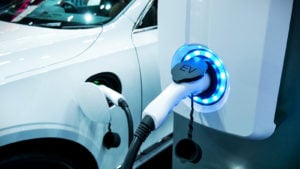
Last, but not least, on this list of electric car stocks to buy for the next 10 years is Chinese EV maker and parts supplier Kandi Technologies.
Best known as the company which pioneered the EV battery swap model — which simply involves replacing an EV battery once it’s drained — Kandi was once considered a leader in China’s EV market. That was back in the early 2010s, when battery swapping was considered a necessity in a world full of EVs that took forever to charge and had limited driving ranges.
But, as EV technology has improved and charging times have dropped alongside rising driving ranges, many countries — including the U.S. — have entirely ditched the battery-swapping model.
China hasn’t. Instead, China is doubling down on its efforts to make the battery-swap model ubiquitous across the entire country through battery standardization.
Why? Because the battery-swap model is cheaper. Consumers don’t own their batteries. They rent the batteries. By removing the cost of battery ownership, the battery-swap model significantly lowers retail prices of EVs, which China hopes will promote mainstream adoption and help the country reach its ambitious sustainability targets.
In any event, all of that means that Kandi’s core technology is coming back into vogue in China. As it does over the next several years, Kandi’s growth narrative will reaccelerate and beaten-up KNDI stock — which has fallen from $20 to $3 in six years — will rebound with vigor.
















